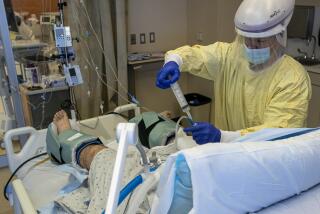Disability Coverage Offers Protection for You, Your Business
- Share via
What would happen to your business if a sudden disability left you unable to run it?
If you answer, “I am my company’s biggest asset, and without me it fails,” here’s some bad news and some good news:
* You stand a far greater chance of becoming disabled before you retire than you do of dying.
* You can protect your business against this threat with disability insurance.
If you’re like many business owners, you pay little attention to the threat of disability. But it can wipe out your business by taking your biggest asset--you--out of the picture. If you have partners, a disability affecting one of you can ruin the prospects of all.
The National Assn. of Insurance Commissioners calculates that a man age 35 stands a 19% chance of becoming disabled for 90 days or more before age 65. A man age 45 has an 18% chance, and one age 55 has a 13% chance. The figures for women are worse--29% at age 35, 24% at age 45 and 15% at age 55.
By contrast, a man age 35 stands only a 0.2% chance of dying in that year, a man age 45 has a 0.45% chance, and a man 55 stands a 1% chance. For women, the numbers are 0.17%, 0.36% and 0.7%, respectively.
What’s more, the morbidity figures are likely to worsen over time for both men and women. Medicines prolong average life spans, but that also means people have more opportunity to fall victim to debilitating disease.
According to the industry-financed group Life Insurance Marketing & Research Assn., between 1960 and 1979 medicine cut the number of deaths caused by hypertension by nearly 70%. In the same period, however, the morbidity rate for hypertension--essentially a measure of the incidence of the disease--doubled for men and went up by 50% for women.
Similarly, for both men and women, the mortality rates for heart disease, cerebrovascular disease and diabetes dropped over the period, but the morbidity rates for these diseases went up.
Put another way, this means that medical science keeps people from dying, but it doesn’t necessarily keep them from getting sick.
*
Few business owners prepare for this eventuality, even though disability presents the far greater threat during their prime working years. It can make working impossible--perhaps for years.
“Business owners buy life insurance to protect their families and their business partners from loss in the event of death,” says Sharon Thompson, a Sherman Oaks-based agent for Northwestern Mutual Life Insurance Co. who specializes in disability insurance.
“But they don’t often consider the even greater possibility that they will become disabled because of sickness or injury. They should cover both contingencies as a matter of course, just like they buy fire and theft insurance to cover the plant.”
Disability coverage doesn’t come cheap. It’s also harder to qualify for disability insurance than for life insurance, and sometimes you fight hard to claim your benefits if disabled. Disability insurers lost so much money to questionable claims in California over the last decade that they made the coverage difficult to get, and they scrutinize claims very carefully.
Many insurers no longer sell disability coverage in California; just this month, Business Men’s Assurance Co. stopped selling it nationwide. Those carriers still selling in California offer less coverage, often at higher premiums than they charged a decade ago.
But the coverage is important if you run your business solo or in partnership with others, Thompson says.
How do you distinguish good coverage from bad? Thompson counsels her clients to check the details--specifically, the definition of disability. Roughly speaking, disability policies fall into three categories, depending on how disability is defined:
* The best policies insure your ability to make a living in your own occupation. Thus, a neurosurgeon who develops arthritis in his hands, for example, collects benefits even if he or she might still teach.
* Policies in the second rank insure your income stream. They pay benefits if your disability prevents you from working in any occupation for which you are reasonably qualified by virtue of training or experience. The arthritic neurosurgeon collects no benefits if he or she can still teach.
* Policies in the third rank insure your ability to work, and they pay a benefit only if you become so disabled that you cannot work in any occupation. The neurosurgeon collects benefits only if a disability renders him or her unable to engage in any kind of work.
*
Obviously, you pay more for a first-tier disability policy than for second-tier coverage. As a rule, professionals such as physicians, certified public accountants and some lawyers qualify for first-tier coverage. Business owners qualify for second-tier coverage.
Generally, if you pay your disability premiums out of your own after-tax dollars, your benefits are tax-free--a big plus. But Thompson urges her clients to analyze their need for disability insurance carefully and then decide how to pay the premiums.
For example, if you own your business and want to protect only your income stream, get as much coverage as you can and pay the premiums out of your own pocket.
But if you and several partners own your business, you might decide to have the business buy coverage that pays a lump-sum benefit equal to each partner’s share in the business. Insurers call this disability buyout coverage. It works just like life insurance purchased to protect a partnership interest, except that it pays in the event of disability, not death.
“There are many other needs that you can cover with disability insurance,” Thompson says, “and it takes some thinking to find out just what the business owner ought to have.
“What is clear is that every business owner should get the coverage. The threat of disability is just too great to be without it.”
*
Freelance writer Juan Hovey can be reached at (805) 492-7909 or via e-mail at jhovey@gte.net
More to Read
Inside the business of entertainment
The Wide Shot brings you news, analysis and insights on everything from streaming wars to production — and what it all means for the future.
You may occasionally receive promotional content from the Los Angeles Times.










